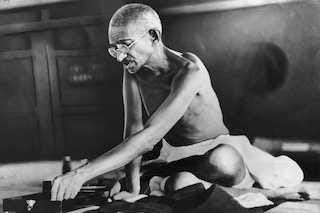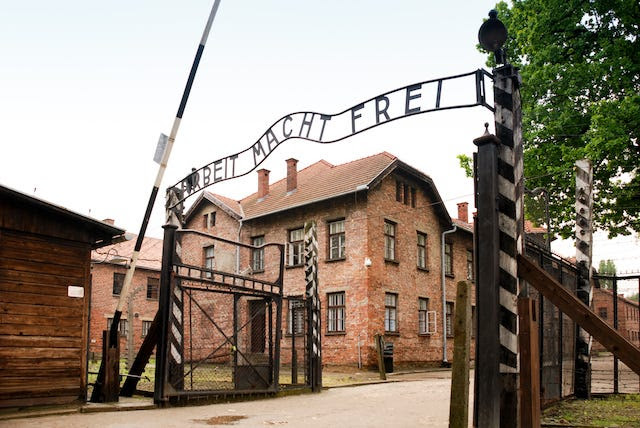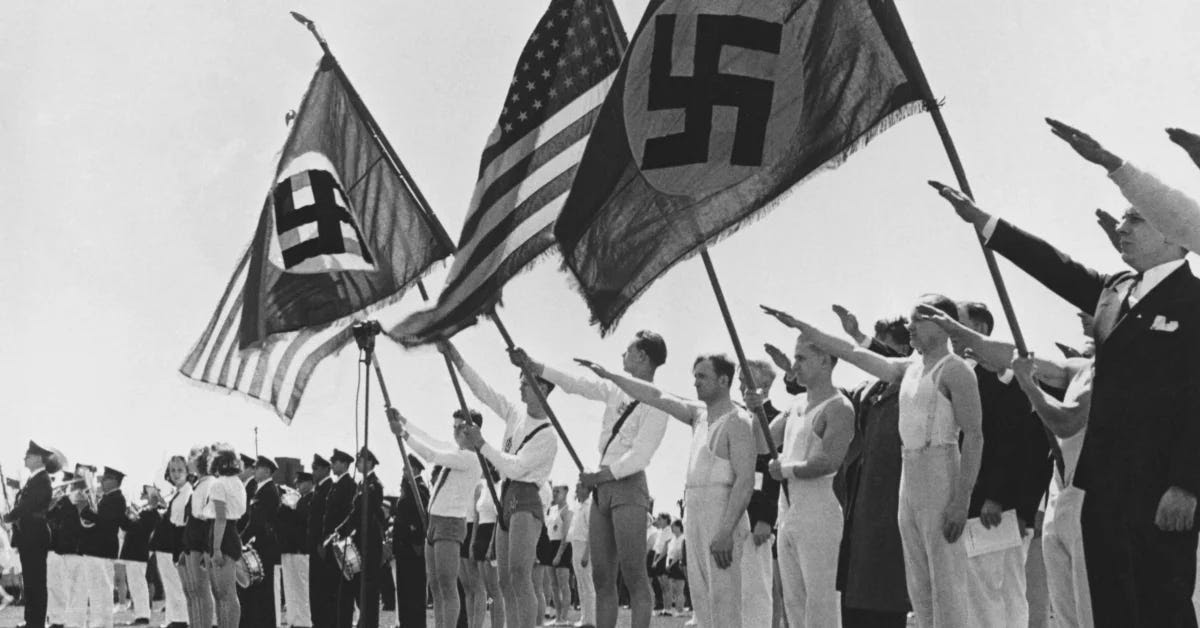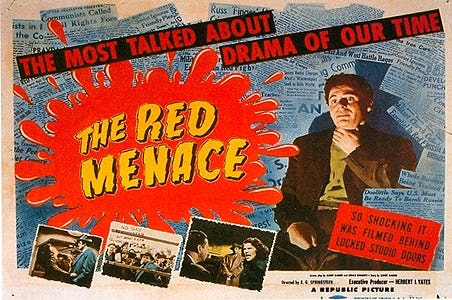Context: In a recent historical post of mine, a kind subscriber named Elise commented: “If history is written by the victors, it gives one pause to think about who actually won the war to hide all this information.”
This inspired me to share the post below to expose even more of what is hidden by the “good guys.”
P.S. Fasten your seatbelts
It was at a February 1945 conference that State Department Political Advisor Laurence Duggan called for “An Economic Charter of the Americas,” loudly complaining that, “Latin Americans are convinced that the first beneficiaries of the development of a country’s resources should be the people of that country.”
From this patently unacceptable premise, the seeds of a 1954 coup were sown, and the U.S.-sponsored results include possibly irreversible environmental devastation and upwards of 200,000 civilians killed or “disappeared.”
With some 60 percent of the vote, Jacobo Arbenz was freely and fairly elected president of Guatemala in 1951. Prior to this, the country was ruled by Arbenz’s kindred spirit, President Juan Jose Arévalo — who won 86 percent of the vote.
Arévalo’s term had given his country a ten-year respite from military rule, during which time he provoked U.S. ire by daring to model his government after the Roosevelt New Deal. (More from Arévalo at the end of this post.)
Wishing to further transform his country, Arbenz’s modest reforms and his legalizing of the Communist Party were frowned upon in American business circles. The Arbenz government became the target of a well-funded U.S. public relations campaign.
Two years after Arbenz became president, Life magazine featured a piece on his “Red” land reforms, claiming that a nation just “two hours bombing time from the Panama Canal” was “openly and diligently toiling to create a Communist state.”
It matters little that the USSR didn’t even maintain diplomatic relations with Guatemala. After all, the Cold War was in full effect.
Ever on the lookout for that invaluable “pretext,” the U.S. business class scored a public relations coup when Arbenz expropriated some unused land controlled by United Fruit Company. His payment offer was predictably deemed inappropriate.
“If they gave a gold piece for every banana,” Secretary of State John Foster Dulles clarified, “the problem would still be Communist infiltration.”
For those unfamiliar with John Foster Dulles, he and his brother Allen guided Sullivan and Cromwell, the most powerful Wall Street law firm of the 1930s. The two brothers — who boycotted their own sister’s 1932 wedding because the groom was Jewish — served as the contacts for the company responsible for the gas in the Nazi gas chambers, I.G. Farben.
During the pre-war period, the elder John Foster led off cables to his German clients with the salutation “Heil Hitler,” and he blithely dismissed the Nazi threat in 1935 in a piece he wrote for the Atlantic Monthly. In 1939, he told the Economic Club of New York, “We have to welcome and nurture the desire of the New Germany to find for her energies a new outlet.”
As for Allen, he was named director of the Central Intelligence Agency (CIA) by President Dwight D. Eisenhower in 1953. Dulles lasted in that position until 1961 when he was fired by President John F. Kennedy for his role in the Bay of Pigs invasion. But Dulles managed to re-emerge two years later as part of the [wait for it] Warren Commission.
We now return to our regularly scheduled war crimes, courtesy of the Home of the Brave .
.
Led by Allen Dulles, the CIA put Operation Success into action. Here’s how Howard Zinn described what followed: “A legally elected government was overthrown by an invasion force of mercenaries trained by the CIA at military bases in Honduras and Nicaragua and supported by four American fighter planes flown by American pilots.”
Operation Success ushered in 40 years of repression, more than 200,000 deaths, and what’s been called “indisputably one of the most inhumane chapters of the 20th century.” These chapters, incidentally, could never have been written without permission from the United States and its surrogates — like Israel.
“The Israelis may be seen as American proxies in Honduras and Guatemala,” stated Israeli journalist, Yoav Karni in Yediot Ahronot. Also, Ha’aretz correspondent Gidon Samet has explained that the most important features of the US-Israeli strategic cooperation in the 1980s were not in the Middle East, but with Central America.
“The U.S. needs Israel in Africa and Latin America, among other reasons, because of the government’s difficulties in obtaining congressional authorization for its ambitious aid programs and naturally, for military actions,” Samet wrote on November 6, 1983, adding that America has “long been interested in using Israel as a pipeline for military and other aid” to Central America.
Earlier that same year, Yosef Priel reported in Davar that Latin America “has become the leading market for Israeli arms exports.” One illustrative example is, of course, Guatemala.
In 1981, shortly after Israel agreed to provide military aid to this oppressive regime, a Guatemalan officer had a feature article published in the army’s Staff College review.
In that article, the officer praised Adolf Hitler, National Socialism, and the Final Solution — quoting extensively from Mein Kampf and chalking up Hitler’s anti-Semitism to the “discovery” that communism was part of a “Jewish conspiracy.”
Despite such seemingly incompatible ideology, Israel’s estimated military assistance to Guatemala in 1982 was $90 million.
What type of policies did the Guatemalan government pursue with the help they received from a nation populated with thousands of Holocaust survivors? This question brings to mind an excerpt from Jennifer Harbury’s book, Bridge of Courage. One member of the Guatemalan resistance Harbury interviewed explained: “Don’t talk to me about Gandhi; he wouldn’t have survived a week here.”

Similar stories can be culled from countries throughout the region, but apparently have had little effect on the foreign policy of the U.S. or Israel. For example, when Israel faced an international arms embargo after the 1967 war, a plan to divert Belgian and Swiss arms to the Holy Land was implemented.
These weapons were supposedly destined for Bolivia where they would be transported by a company managed by none other than Klaus Barbie… as in “The Butcher of Lyon.”
Any moral reservations about such an arrangement are dismissed with a vague “national security” excuse that should sound familiar to any American. “The welfare of our people and the state supersedes all other considerations,” pronounced Michael Schur, director of Ta’as, the Israeli state military industry, in the August 23, 1983, Ha’aretz. “If the state has decided in favor of export, my conscience is clear.”
One Jewish figure that might be expected to find fault with such a policy was Elie Wiesel. An episode from mid-1985, documented by Yoav Karni in Ha’aretz, should put to rest any exalted expectations of the late moralist.
When Wiesel received a letter from a Nobel Prize laureate documenting Israel’s contributions to the atrocities in Guatemala, suggesting that he use his considerable influence to put a stop to Israel’s practice of arming neo-Nazis, Wiesel “sighed” and admitted that he did not reply to that particular letter.
“I usually answer at once,” he explained, “but what can I answer to him?”
One is left to only wonder how Wiesel’s silent sigh might have been received if it was in response to a letter not about Jewish complicity in the murder of Guatemalans but instead about the function of Auschwitz during the 1940s.

In closing, I ask you to deeply consider some words from the aforementioned former Guatemalan president, Juan Jose Arévalo. As he stepped down in 1951, Arévalo had this to say about the aftermath of a certain world war commonly described as “good”:
“The arms of the Third Reich were broken and conquered but in the ideological dialogue, the real winner was Hitler.”

Never forget: This is just some of what we’re still up against today.
Whenever you opt to trust any proclamation made by the government (or the bankers and corporations that own the government), you are committing self-sabotage by directly playing into their diabolical hands.
I don’t share this to add to the gloom and doom. It’s not meant to cause anyone to lose hope. Rather, I find it incredibly empowering to gain and raise awareness. The better we each comprehend the tactics of evil, the better equipped we are to resist its lies and manipulation.
Let’s all start keeping our guard up…
This content originally appeared on Dissident Voice and was authored by Mickey Z..
Mickey Z. | Radio Free (2023-06-23T23:20:39+00:00) “The arms of the Third Reich were broken but the real winner was Hitler”. Retrieved from https://www.radiofree.org/2023/06/23/the-arms-of-the-third-reich-were-broken-but-the-real-winner-was-hitler/
Please log in to upload a file.
There are no updates yet.
Click the Upload button above to add an update.




